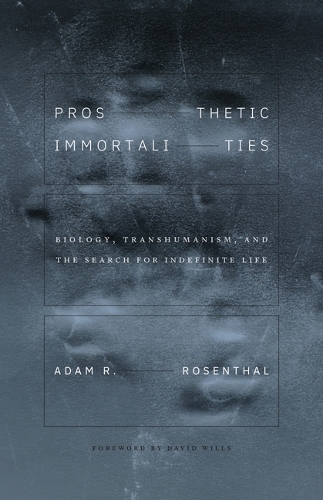
Prosthetic Immortalities: Biology, Transhumanism, and the Search for Indefinite Life
(Paperback)
Available Formats
Publishing Details
Prosthetic Immortalities: Biology, Transhumanism, and the Search for Indefinite Life
By (Author) Adam R Rosenthal
Foreword by David Wills
University of Minnesota Press
University of Minnesota Press
1st December 2024
United States
Classifications
Professional and Scholarly
Non Fiction
Impact of science and technology on society
Philosophy of mind
129
Physical Properties
Paperback
352
Width 140mm, Height 216mm, Spine 18mm
425g
Description
Examining the links between todays ideas of radical life extension and age-old notions of immortality
From Platos notion of generation to Derridas concept of survival to such modern phenomena as anti-aging treatments, cryogenics, cloning, and whole-brain uploads, Adam Rosenthals Prosthetic Immortalities shows how the dream of indefinite life has always been a technological one: a matter of prosthesis. He argues that every biological instance of perpetual life, from one-celled organisms to rejuvenating jellyfish to Henrietta Lackss immortal cancer cells, always results in the transformation of the original being. There can, therefore, be no certainty of immortality. Yet, because finite mortal life is already marked by difference, division, and change, as Rosenthal concludes: the problem of immortality will not cease to haunt us.
Prosthetic Immortalities examines the persistence of humans aspirations of deathlessness, showing that the link between immortalization and prostheticization is not unique to a single period but is, rather, a ubiquitous element of the discourse of immortality, encompassing both modern technoscientific efforts and religious discourses of an afterlife. Rosenthal asks to what extent the emergence of a virtual, posited, immortal presence follows from the tenets of empirical scienceand not simply from the discourse of biology but also, and more radically still, from biological organization itself.
Rosenthal ultimately argues that the discovery of biological immortalslifeforms that naturally have indefinitely long lifespans, such as cancer cells and bacteriapresent novel conceptual difficulties for traditional philosophical approaches to mortality and selfhood, asking whether it is life itself that first births immortalizing prostheses.
Reviews
"Rigorous, compelling, and beautifully written, Prosthetic Immortalities is at the vanguard of the new wave in Derrida studies. Problematizing and deconstructing transhumanist technologies, Adam R. Rosenthal offers to readers both clarity and new understanding as he lucidly and insightfully illuminates Derridas notions of lifedeath and survival in the contexts of biology, technology, and ontology." Nicole Anderson, founding editor, Derrida Today Journal
Author Bio
Adam R. Rosenthal is associate professor of global languages and cultures at Texas A&M University. He is author of Poetics and the Gift: Reading Poetry from Homer to Derrida.
